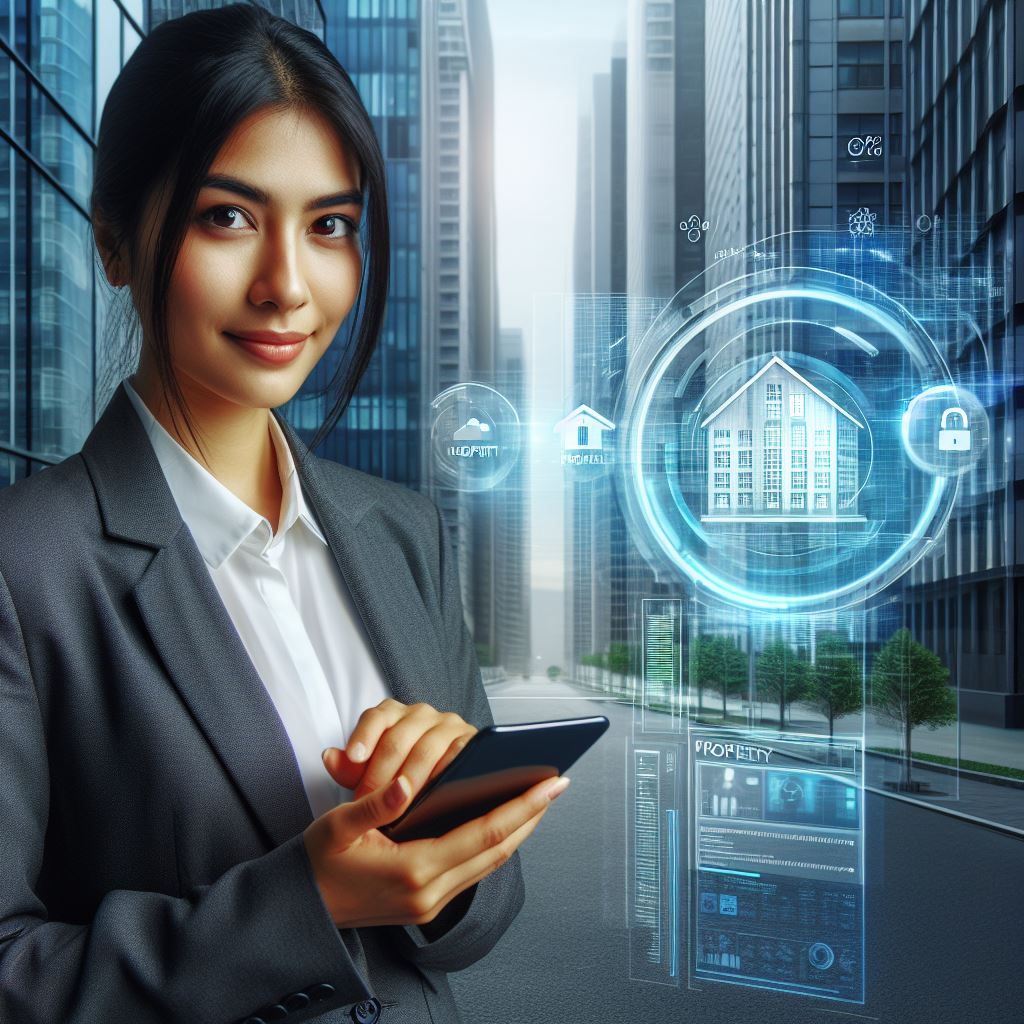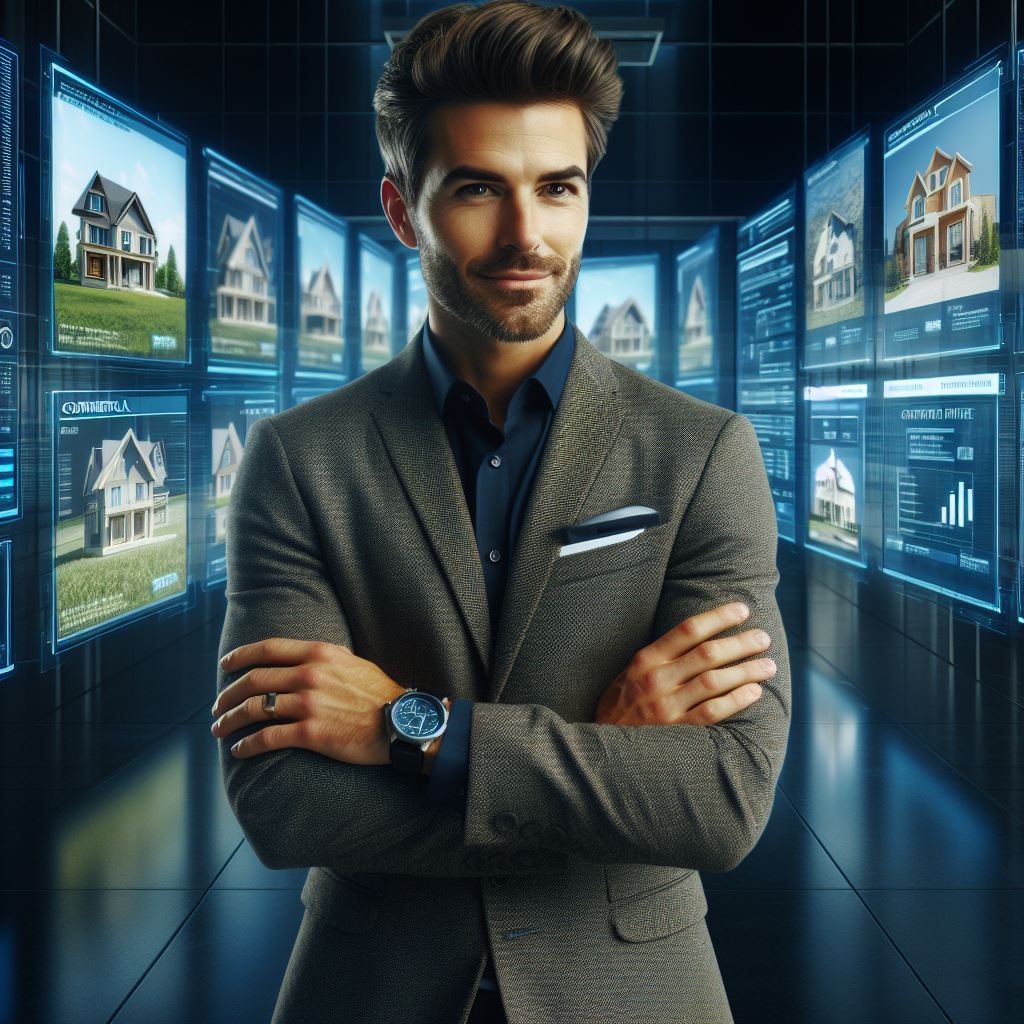Introduction
Property management plays a crucial role in the real estate industry.
It involves overseeing, controlling, and maintaining various properties for optimal use and profitability.
As technology continues to advance, its influence expands across numerous industries.
Real estate is no exception, as innovative solutions are transforming the way properties are managed.
This blog chapter will delve into the topic of how smart technology is revolutionizing property management.
Smart tech refers to the integration of various devices and systems that enable enhanced control, monitoring, and automation of property-related tasks.
Definition and Examples of Smart Tech in Property Management
Smart tech refers to the use of advanced technologies to automate and optimize various aspects of property management.
It involves the integration of internet-connected devices and systems to enhance efficiency, convenience, security, and energy savings.
Smart Locks and Keyless Entry Systems
Smart locks and keyless entry systems have revolutionized property management by eliminating the need for physical keys.
These systems allow property managers to grant access remotely and track entry activities.
For example, a property manager can provide virtual keys to tenants, contractors, or service providers through a smartphone app.
This enables secure and convenient access without the risk of lost or stolen keys.
Smart Thermostats for Energy Efficiency
Smart thermostats have become a popular addition to property management, providing greater control over energy usage and reducing utility costs.
These devices automatically adjust temperature settings based on occupancy and time schedules.
With smart thermostats, property managers can remotely monitor and manage heating, ventilation, and air conditioning (HVAC) systems.
They can optimize energy consumption by setting temperature limits, implementing zoning, and receiving energy usage reports.
Smart Surveillance Systems for Enhanced Security
Smart surveillance systems employ advanced technologies like high-definition cameras, motion sensors, and cloud-based storage to enhance property security.
These systems allow property managers to monitor and record activities in real-time.
For instance, smart surveillance systems can detect unauthorized access, triggered alarms, or suspicious activities.
Property managers can receive instant notifications and remotely view live or recorded footage through smartphone apps.
Smart Home Automation for Convenience and Efficiency
Smart home automation systems offer a wide range of functionalities to make property management more convenient and efficient.
These systems allow property managers to control and automate various devices and appliances.
For example, property managers can remotely control lighting, blinds, and appliances through a centralized smart hub or mobile app.
They can schedule automatic routines, such as turning on/off lights, adjusting thermostat settings, and controlling irrigation systems.
In fact, smart tech in property management involves the integration of internet-connected devices and systems to automate and optimize various processes.
Smart locks, thermostats, surveillance systems, and home automation offer improved security, energy efficiency, convenience, and control.
Read: E-Real Estate: Transforming Property Sales
Advantages and Benefits of Smart Tech in Property Management
In today’s modern world, smart technology has revolutionized various industries and sectors, including property management.
The integration of smart tech brings numerous advantages and benefits that enhance security, convenience, energy efficiency, and cost-effectiveness.
Improved security: Monitoring and control capabilities
One of the significant advantages of smart tech in property management is the improved security it offers.
With smart surveillance cameras, motion sensors, and access control systems, property managers can effectively monitor and control the premises.
These technological advancements enable real-time monitoring, detecting any suspicious activities, and issuing alerts or notifications to the property management team or authorities.
Such capabilities not only deter potential intruders but also provide peace of mind to tenants and property owners.
Enhanced convenience: Remote access and automation features
Smart tech also brings enhanced convenience to property management.
Through remote access and automation features, property managers can efficiently perform various tasks without being physically present on-site.
For instance, smart locks and building access systems with digital keys enable remote control of entry points, allowing authorized personnel to grant access to tenants or service providers.
This eliminates the need for physical key exchanges and simplifies the management of multiple properties.
Moreover, automated systems for heating, ventilation, and air conditioning (HVAC), lighting, and appliances enable property managers to remotely control and adjust settings based on occupancy or energy-saving preferences.
This convenience benefits both property managers and tenants by optimizing comfort and energy usage.
Energy efficiency: Optimization of energy usage and cost savings
Implementing smart tech in property management results in significant energy efficiency improvements.
By integrating smart thermostats, sensors, and energy management systems, property managers can optimize energy usage and reduce utility costs.
For example, smart thermostats adapt to occupants’ schedules and adjust the temperature accordingly, reducing energy wastage when spaces are unoccupied.
Similarly, occupancy sensors automatically turn off lights and other devices when no one is present, minimizing electricity consumption.
Through real-time data analysis and predictive algorithms, smart energy management systems identify patterns and provide recommendations for optimizing energy consumption further.
These cost-saving measures also contribute to a property’s sustainability and environmental footprint.
Cost-effectiveness: Long-term savings through preventive maintenance and resource management
Smart tech in property management also offers long-term cost-effectiveness through preventive maintenance and resource management.
By utilizing sensors and monitoring systems, property managers can detect maintenance issues before they escalate.
For example, water leak detection sensors can identify leaks early on, preventing potential water damage and costly repairs.
Timely identification of equipment malfunctions or system failures allows property managers to address issues promptly, minimizing downtime and disruption for tenants.
Smart tech also aids in resource management, such as water and energy consumption.
Real-time monitoring and measurement of resource usage enable property managers to identify areas of inefficiency and implement strategies to reduce waste, leading to significant cost savings over time.
Additionally, smart tech allows for remote vendor management, preventive maintenance scheduling, and inventory tracking, streamlining operational processes and reducing administrative costs.
In short, the integration of smart technology in property management brings numerous advantages and benefits.
Improved security, enhanced convenience, energy efficiency, and cost-effectiveness are key factors that contribute to the success and effectiveness of property management in today’s digital era.
Impact on Tenant Experience and Satisfaction
In this section, we will explore how smart tech revolutionizes the tenant experience and significantly improves overall satisfaction.
From seamless move-in and move-out processes to faster response times for repairs and maintenance, customizable settings, and personalization options, smart tech has a profound impact on tenant satisfaction and retention rates.
Seamless move-in and move-out processes
One of the main benefits of smart tech in property management is its ability to streamline the move-in and move-out processes for tenants.
With smart locks and keyless entry systems, tenants can easily access their apartments without the hassle of physical keys or coordination with property managers.
This convenience enhances the tenant experience from the moment they set foot in the property.
Additionally, smart home automation systems allow tenants to connect and control various devices in their new homes effortlessly.
They can adjust thermostat settings, set up smart appliances, and even customize lighting preferences, creating a personalized living space from day one.
This seamless transition not only saves time and energy for both tenants and property managers but also enhances tenant satisfaction.
Faster response times for repairs and maintenance
Property maintenance is a crucial aspect of tenant satisfaction.
With the integration of smart tech, property managers can address repairs and maintenance requests more efficiently and promptly.
Smart sensors and monitoring systems can detect issues such as water leaks, HVAC malfunctions, or electrical problems in real-time.
Through automation, these systems can notify both tenants and property managers about the problem, allowing for immediate action.
Property managers can then deploy maintenance staff precisely to the affected area, ensuring faster resolution.
This quick and responsive approach to repairs and maintenance not only saves time and money but also contributes to a positive tenant experience.
Customizable settings and personalization options
Smart tech enables tenants to have more control and customization over their living environment.
With smart thermostats and automated lighting systems, tenants can easily set desired temperatures and lighting preferences throughout their homes.
They can create schedules and routines that align with their daily activities and optimize energy consumption.
Furthermore, smart security systems provide tenants with a heightened sense of safety and security.
They can personalize alarm settings, monitor and control access to their apartments, and receive real-time notifications on any suspicious activities.
This level of customization offers peace of mind and enhances the overall tenant experience.
Increased overall satisfaction leading to higher tenant retention rates
By incorporating smart tech into property management, landlords can significantly improve tenant satisfaction, leading to higher tenant retention rates.
A seamless move-in process, swift response to maintenance requests, and customizable settings all contribute to a positive living experience.
When tenants feel satisfied and comfortable in their homes, they are more likely to renew their leases and recommend the property to others.
This not only reduces vacancies but also boosts the reputation and profitability of the property.
Smart tech, with its ability to enhance tenant satisfaction, becomes a crucial tool for property managers in retaining valuable tenants.
In general, smart tech has a transformative impact on tenant experience and satisfaction.
Through seamless move-in and move-out processes, faster response times for repairs and maintenance, customizable settings, and personalization options, tenants enjoy a superior living experience.
This increased satisfaction leads to higher tenant retention rates, benefiting both property managers and tenants alike.
Read: Automation Tools for Efficient Property Management
Challenges and Potential Drawbacks of Smart Tech in Property Management
While smart technology offers numerous benefits in property management, it also poses several challenges and potential drawbacks that need to be addressed.
It is crucial to identify and mitigate these issues to ensure the successful implementation and usage of smart tech in the industry.
Initial Investment and Installation Costs
One of the primary challenges of incorporating smart technology into property management is the initial investment and installation costs.
Implementing smart devices such as sensors, locks, and monitoring systems can be expensive, especially for property owners managing multiple units or buildings.
The cost of purchasing and installing these devices needs to be carefully evaluated and justified with the expected benefits and return on investment.
Potential Privacy Concerns and Data Security Risks
As smart tech collects and processes data, there is an increased risk of privacy breaches and data security issues.
Smart devices often collect sensitive information about tenants, such as their daily routines and usage patterns.
Property managers must implement robust security measures to protect this data from unauthorized access and ensure compliance with privacy regulations.
Additionally, data breaches can expose property management companies to legal and financial liabilities.
It is essential to prioritize data security and work with reputable smart tech providers that follow rigorous security protocols.
Dependence on Stable Internet Connectivity
Smart devices rely on a stable internet connection to function effectively.
Any interruptions or outages in the internet service can disrupt the connectivity and performance of these devices.
This dependency on internet connectivity can pose challenges, especially in areas with limited broadband access or frequent service disruptions.
Property managers need to ensure reliable internet infrastructure to guarantee the seamless operation of smart tech solutions.
Learning Curve for Property Managers and Tenants
The introduction of smart tech in property management requires both property managers and tenants to adapt to new technologies.
Property managers need to familiarize themselves with the devices, understand their functionalities, and troubleshoot any issues that may arise.
Similarly, tenants need to learn how to operate smart devices and make the most out of their features.
This learning curve can be a potential drawback, especially for individuals who may not be tech-savvy or resistant to change.
It is crucial to provide proper training and support to ensure a smooth transition and maximize the benefits of smart tech in property management.
In review, while smart technology offers significant advantages in property management, such as improved efficiency and tenant experience, it also presents challenges and potential drawbacks.
The initial investment and installation costs, privacy concerns, internet connectivity dependence, and the learning curve for property managers and tenants all need to be carefully addressed and managed.
By proactively mitigating these challenges, property management companies can leverage the full potential of smart tech to revolutionize their operations and enhance the overall property management experience.
Read: Cloud-Based Solutions in Property Management

Overcoming Challenges and Implementing Smart Tech
Implementing smart technology in property management can revolutionize the way properties are managed, but it comes with its own set of challenges.
Property managers must take certain steps to overcome these challenges and successfully implement and integrate smart tech into their operations.
Here are some tips and strategies for property managers considering implementing smart tech:
Researching and understanding the different smart tech options available
The first step for property managers is to thoroughly research and understand the various smart tech options available in the market.
This includes smart locks, automation systems, energy management devices, and more.
Gathering information about these options will help property managers make informed decisions on what best suits their needs.
Creating a budget and assessing cost-benefit analysis
Implementing smart tech requires a careful evaluation of costs and benefits.
Property managers need to create a budget specifically for smart tech implementation, considering costs such as hardware installation, software integration, and maintenance.
Additionally, conducting a cost-benefit analysis will help property managers determine if the investment is justified by the potential returns and efficiencies.
Prioritizing security and privacy considerations
When implementing smart tech, property managers must prioritize the security and privacy of their tenants.
This includes ensuring that the chosen smart tech options have robust encryption protocols, secure access controls, and data protection measures.
Conducting regular security audits and staying up-to-date with the latest cybersecurity practices will help mitigate any potential risks.
Providing adequate training and support for property managers and tenants
Training and support are crucial components for successful smart tech implementation.
Property managers must invest in comprehensive training programs for both themselves and their staff to ensure they understand how to use and troubleshoot the smart tech systems.
It is equally important to provide ongoing support to tenants, addressing any questions or concerns they may have.
By following these tips and strategies, property managers can overcome challenges and successfully integrate smart tech into their property management operations.
The benefits of smart tech are numerous, including improved efficiency, enhanced security, cost savings, and increased tenant satisfaction.
Embracing this technology is a step towards transforming traditional property management into a more streamlined and tech-savvy industry.
Read: Smarter Real Estate: AI’s Growing Impact
Case Studies and Success Stories
Real-life case studies showcasing improved efficiency and tenant satisfaction
In recent years, numerous property management companies have successfully implemented smart technology solutions, resulting in improved efficiency and increased tenant satisfaction.
One such case study is the implementation of a smart energy management system in a large residential complex.
By integrating smart meters, wireless sensors, and automated controls, the property management company was able to monitor and optimize energy usage across multiple buildings in real-time.
As a result, they achieved significant cost savings by identifying energy-intensive areas and implementing strategies to reduce consumption.
Moreover, tenants living in the complex experienced improved comfort and convenience.
The smart technology enabled them to control their home’s temperature, lighting, and security systems remotely through a mobile app.
This level of control empowered tenants, leading to higher overall satisfaction and decreased tenant turnover.
Testimonials from property managers who have experienced positive results
Property managers who have embraced smart technology have witnessed numerous benefits and positive outcomes in their daily operations.
One testimonial comes from a senior property manager of a large commercial property.
Through the implementation of a smart building management system, the property manager was able to achieve significant savings in operational costs.
The system provided real-time data on energy consumption, enabling them to identify inefficiencies and implement energy-saving initiatives effectively.
In addition, the smart system allowed the property manager to remotely monitor and control various building functionalities, such as lighting, HVAC systems, and security.
This level of control increased their ability to respond promptly to maintenance requests and address potential issues before they became significant problems.
As a result, tenant satisfaction levels soared, leading to higher tenant retention rates and attracting new tenants who valued the convenience and advanced technology offered by the property.
These case studies and success stories provide concrete evidence of the positive impact of smart technology on property management.
By leveraging innovative solutions, property managers can optimize energy usage, improve efficiency, and enhance tenant satisfaction.
Whether it’s implementing smart meters, automated controls, or mobile apps, these technologies enable property managers to monitor and manage their properties in real-time, resulting in cost savings, streamlined operations, and improved tenant experiences.
Property managers who have embraced smart tech solutions have seen their properties become more attractive to both tenants and investors.
The ability to provide a connected and convenient living or working environment enhances overall tenant satisfaction and differentiates their properties in a competitive market.
As the demand for smart technology in property management continues to grow, more case studies and success stories are likely to emerge.
These real-world examples serve as inspiration for other property managers considering implementing smart tech solutions and highlight the tremendous potential for transforming the industry.
Future Trends and Predictions
Integration of artificial intelligence and machine learning for predictive maintenance
The future of smart tech in property management is heading towards the integration of artificial intelligence and machine learning.
These advanced technologies will revolutionize the way property maintenance is carried out.
Artificial intelligence (AI) and machine learning algorithms can analyze vast amounts of data collected from various sensors and devices.
By analyzing this data, AI can identify patterns and predict potential maintenance issues before they occur.
For example, AI algorithms can detect anomalies in energy consumption patterns or usage of appliances.
This can help property managers detect faulty equipment or identify energy-saving opportunities.
Machine learning algorithms can also optimize maintenance schedules.
By analyzing historical data and patterns, algorithms can predict when a particular component or system is likely to fail.
This enables property managers to proactively schedule maintenance, reducing downtime and costs.
With the integration of AI and machine learning, property managers can shift from reactive maintenance to proactive and predictive maintenance strategies.
This not only improves efficiency but also reduces the risk of unexpected breakdowns and costly repairs.
Enhanced connectivity with IoT devices for smarter homes
Another future trend in smart tech for property management is enhanced connectivity with Internet of Things (IoT) devices. IoT devices are smart devices that can connect and communicate with each other over the internet.
In property management, IoT devices can be used to create smarter homes.
These devices can include smart thermostats, lighting systems, security cameras, and more.
They can be controlled remotely and provide real-time data on energy consumption and security.
Enhanced connectivity with IoT devices allows property managers to have greater control and monitoring capabilities.
For example, property managers can remotely adjust thermostat settings based on occupancy patterns or turn off lights when no one is present.
This can lead to significant energy savings and improved sustainability.
Furthermore, IoT devices can also provide valuable data on occupancy, usage patterns, and tenant preferences.
Property managers can leverage this data to optimize space utilization, improve tenant satisfaction, and tailor services to specific needs.
Expansion of remote monitoring and control capabilities
The future of property management will see an expansion of remote monitoring and control capabilities.
Advancements in smart tech will enable property managers to monitor and control various aspects of a property remotely.
For instance, property managers can remotely monitor the performance of HVAC systems, ensuring optimal heating and cooling efficiency.
They can also receive alerts and notifications for any maintenance issues or emergencies, allowing for quick response and resolution.
Remote monitoring and control capabilities also extend to security systems.
Property managers can remotely monitor security cameras, access control systems, and alarm systems.
They can receive real-time notifications of any suspicious activity or breaches, enhancing property security.
This expansion of remote monitoring and control capabilities improves operational efficiency and convenience for property managers.
It allows them to efficiently manage multiple properties from a central location, reducing the need for physical presence.
Continued focus on energy efficiency and sustainability
Energy efficiency and sustainability will continue to be key focuses in the future of smart tech for property management.
With increasing environmental awareness and regulations, property managers are striving towards greener and more sustainable practices.
Smart tech plays a crucial role in achieving energy efficiency and sustainability goals.
Through real-time monitoring and optimization of energy consumption, property managers can identify and address energy wastage.
Smart thermostats can automatically adjust heating and cooling settings based on occupancy patterns, reducing energy consumption when spaces are unoccupied.
Smart lighting systems can use occupancy sensors to automatically turn off lights in unoccupied areas.
Moreover, smart tech enables property managers to track and analyze energy usage data, identify energy-saving opportunities, and set targets for improvement.
This data-driven approach allows for better decision-making and continuous improvement in energy efficiency.
In addition to energy efficiency, smart tech can also contribute to sustainability through waste management and water conservation.
Smart waste management systems can optimize waste collection routes, reducing fuel consumption and greenhouse gas emissions.
Smart irrigation systems can monitor soil moisture levels and adjust watering schedules, minimizing water waste.
By harnessing the power of smart tech, property managers can not only reduce operational costs but also contribute to a more sustainable and eco-friendly future.
As we look ahead, the future of smart tech in property management holds immense potential.
From predictive maintenance with AI and machine learning to enhanced connectivity with IoT devices, the possibilities are endless.
With a continued focus on energy efficiency and sustainability, smart tech will revolutionize the way property management is conducted, making it more efficient, cost-effective, and sustainable.
Conclusion
Smart tech has revolutionized property management by streamlining processes and enhancing efficiency.
By embracing these innovations, property managers can enjoy a transformative impact on their business.
Throughout this blog post, we have discussed key points such as the automation of tasks, improved security measures, and energy-saving features.
These advancements have simplified property management operations, allowing for better tenant experience and increased profitability.
The transformative impact of smart tech cannot be overstated.
Property managers now have access to real-time data and analytics, enabling them to make informed decisions and optimize operations.
This leads to cost savings, improved tenant satisfaction, and increased property value.
It is crucial for property managers to embrace and adapt to these innovations for long-term success.
By keeping up with the latest smart tech solutions, property managers can stay ahead of the competition and meet the evolving needs of tenants.
In a technology-driven world, remaining stagnant is not an option.
Property managers must be open to change and adopt smart tech tools to stay relevant and meet the expectations of tech-savvy tenants.
Smart tech has revolutionized property management, offering numerous benefits and opportunities for growth.
By leveraging these technologies, property managers can streamline operations, improve efficiency, and ultimately achieve long-term success in the industry.
So, don’t miss out on the transformative impact of smart tech and start embracing these innovations today.




